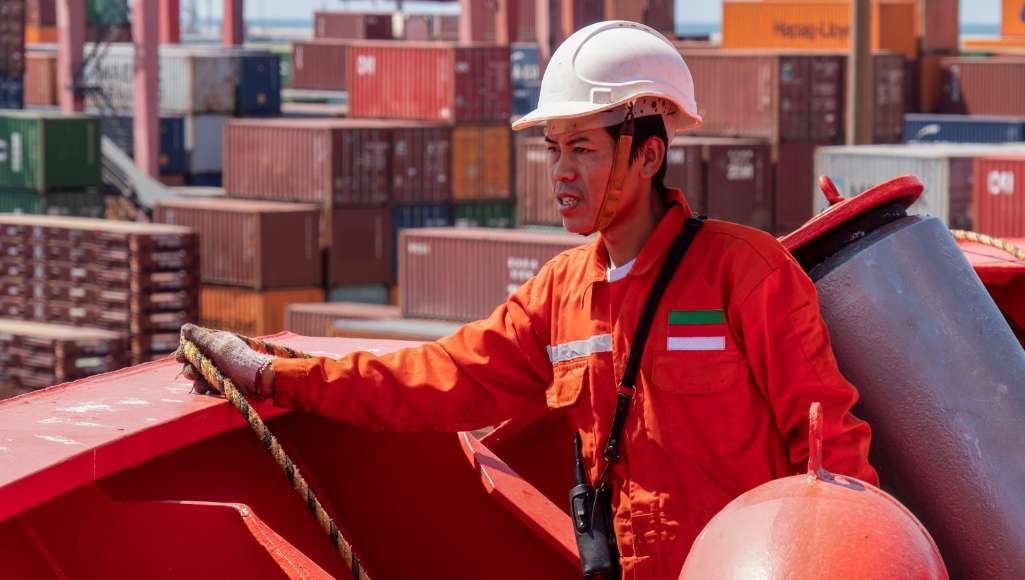
Health and Safety: Two Sides of the Same Coin
When we use the phrase “safety at sea,” we’re actually referring to a multifaceted concept that includes procedures, measures and equipment that keep both vessel and crew safe, or that can be called on in an emergency. A number of forces and factors work interdependently to influence safety at sea, and health is one of the most important.
In fact, health and safety can hardly exist without one other – especially at sea. They are best seen as two sides of one coin.
The Health and Safety Connection
Safety is strongly correlated with both physical and mental wellness, as well as environmental health factors, which in turn impact human wellness. Mentally and physically healthy seafarers working in an environment that proactively supports their wellbeing are less likely to cause – or suffer from – accidents, injuries, and other events that might compromise human safety and the vessel itself.
However, safe vessel operations depend on crew members who are physically fit for duty, which depends on their mental fitness, which depends on environmental health, and which depends on a whole host of factors that operators can choose whether or not to proactively invest in. These include nutrition, sleep, exercise, air quality, healthcare access, social wellbeing and more. Together, they create a state of health and wellness, and in turn, an elevated chance of mitigating risk and maintaining safety.
Fatigue, Distraction and Accidents
Fatigue is a grave threat to safety at sea, and the fight against fatigue is best fought on multiple fronts. The first is physical fitness, which is achieved through things like proper nutrition, exercise and sleep. The second is mental health. Just like physical health, emotional and mental wellness require sleep, food, exercise, good relationships, access to care and more. A mentally and physically compromised crew is more likely to be tired, and fatigue combined with stress is a recipe for distraction, error, poor decision-making and accidents, which can be life-threatening in a maritime environment.
As this article explains, “Making sound decisions and mental wellness go hand in hand. Employees with good mental health…can evaluate circumstances, weigh possible hazards, and select the safest and most efficient courses of action when their minds are clear.”
Multiple scientific studies have likewise concluded that stress, sleep disruptions and fatigue negatively affect situational awareness, especially during routine tasks that no longer demand the same level of attention.
Take, for example, a seafarer who is reaching the end of his contract. He is performing a task he’s done hundreds of times before. After months of inadequate sleep, nutrition and exercise, and the challenges of being isolated at sea, he is mentally and physically exhausted, his mind already wandering to thoughts of family and time off work.
Despite having done this task many times, the lack of concentration and fatigue increase his chances of an accident. Studies have found that many dangerous errors are caused by a “perpetual mental load” rather than any external factors or stimuli.
“Sleep deprivation degrades cognitive processing, affecting everything from memory to reflexes,” explains this article about the impact of sleep on workplace accidents. “With less sleep, your reaction time slows. This means you make decisions less quickly and accurately. You are also more likely to misjudge your own abilities and take unwise risks. As a result, excessive sleepiness can lead to consequential errors and accidents.”
The Impact of Social Wellness
As fundamentally social animals, humans thrive on healthy relationships. This is even more critical at sea, where crew members perform high-stress work in a small, isolated and highly interdependent group. A successful maritime operation requires an almost military-level of social cohesion, trust and psychological safety.
Investing in a crew’s social wellbeing can improve morale and inspire positive interactions, which in turn help foster an effective, supportive and high-performing team. Social wellness also correlates with good mental health. A crew cannot thrive socially if its members are not mentally and emotionally healthy.
According to the World Health Organization, some of the biggest threats to mental health in the workplace are issues the maritime industry has long grappled with. They include excessive workloads or work pace; long, unsocial or inflexible hours; unsafe or poor physical working conditions; an organisational culture that enables negative behaviours; and violence, harassment or bullying.
Great teams are not born. They are built. Creating an integrated, socially healthy crew requires codes of conduct (that are enforced) as well as initiatives that foster interaction and build relationships. Strong bonds of camaraderie improve performance and motivate seafarers to work with one another, collaboratively, in an environment where everyone is missing the support of loved ones back home.
Furthermore, research has found “significant, strong positive correlation between employees' satisfaction with their company and employee productivity…with more business-unit level profitability.”
Good Food and Sunshine
If you’ve set foot in the French or Italian Riviera, the benefits of good food and sunlight seem rather obvious, so it should come as no surprise that seafarers who enjoy good nutrition and exposure to natural light report fewer health problems and illnesses.
Crew members can also benefit from nutritious, culturally appropriate food choices. First, eating well supports physical health, which in turn impacts mental and social wellness. Eating is also a social activity. For example, providing a mostly Filipino crew with access to their native diet could inspire happier, more social mealtimes, a better sense of camaraderie, and a heightened state of wellbeing.
On the topic of sunlight, a lack of sun exposure correlates with poor mental health, while adequate sunshine can influence both serotonin and vitamin levels in the body. It may even be a factor in the largest source of maritime medical claims: cardiovascular issues. According to one study, “Insufficient sunlight is a new risk factor for hypertension, perhaps even in the general population.”
The Future is Won By Caring
Investing in a crew’s physical, mental and social health is, ultimately, an investment in safe vessel operations and a more productive, sustainable business. The maritime industry is powered by human beings who must be looked after with the same care and foresight as any physical asset. There is no safety without health, and no productivity without safety. As such, maritime companies who approach health and safety as a singular investment will position themselves for greater success in the long term.


